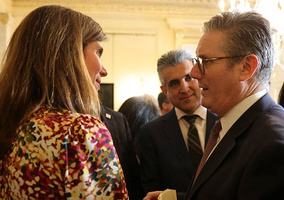Recently, I brought together some of Britain’s leading philanthropists, wealth advisers and charities to celebrate the power of giving. Many were generally positive about the world despite its terrible ills and had good reason to be cheerful. According to the recent Sunday Times Giving List, charitable giving by the UK’s top 100 philanthropists is up by £500m on the year. Meanwhile, research published today by UKGrantmaking shows that donor-advised funds gave 20% more (£2.1bn) to charities last year.
One thorny topic echoed through the halls: the drain of wealthy individuals from the UK. Anecdotes were shared: “My neighbour, a lawyer and an investment banker and their two children are off to the UAE. They are done with slow growth and high-tax Britain.”
Let’s avoid the politics and not opine on the recent changes to non-dom and inheritance tax rules. The fact is that fewer wealthy people are choosing Britain as a place to live and work. More pertinently, these people donate large sums of their wealth to charity.
According to residence and citizenship advisory firm Henley & Partners, the UK saw a net loss of 9,500 millionaires in 2024. That’s more than double the 4,200 who left in 2023. Britain ranks second only to China in projected outflows. It is also one of the few countries facing a negative growth in the number of new millionaires over the last decade. The UAE, for example, has grown its number of millionaires by 77% since 2013. We have gone backwards by 8%.
US arrivals
As Britain faces a drain of its high-net-worth individuals, the arrival of wealthy Americans presents a unique opportunity for UK charities to capture their deep philanthropic culture. According to recent data from the Home Office, a record number of Americans have applied for UK residency since Trump took power. In the year up to March, more than 6,000 US citizens have applied to either become British citizens or work here. This is the highest number since records began in 2004.
While we can’t be sure how much these Americans give to charity, we do know that the USA has an insatiable appetite for philanthropy. That’s not just because there are substantially more millionaires in the US (5.5 million compared to just 602,500 in the UK), but they have a culture that expects you to give back if you make money. I saw this first-hand when setting up my charity in the early 2000s. We administer donor-advised funds on behalf of philanthropists, a simple vehicle for giving that we adopted from the United States. My hunch was, why couldn’t the UK cultivate large donors in the same way?
Asking the wealthy for money
The movement of wealthy individuals raises two challenges for fundraisers. Firstly, charities should learn how to facilitate cross-border donations, which can be complex and subject to multiple rules.
Looking globally is crucial. We recently announced a new partnership with the international philanthropy network Myriad Alliance to facilitate giving across borders.
Secondly, charities must be bolder and better at asking the wealthy for money. Our data shows that donors are willing to give – we have raised over $1bn in 20 years from individuals – but charities often find it difficult to get them to commit to the long term. Many charities default to safer income streams: government grants, trusts and foundations, and small donations generated through mass marketing.
Raising money from individuals requires cultivating deep and long-lasting relationships with donors, explaining how gift aid and the gifting of shares work, and understanding their motivations for giving. These are individuals who are experts at growing businesses and hitting targets. Demonstrating the measurable impact of their donation will encourage them to invest more. They rely on wealth advisers, so why not have a philanthropy adviser too?
If we really want to encourage those on the move to continue donating, we need to shake off the negative preconceptions about why they give and help them understand what positive returns they can generate.
After all, we are a generous nation, and as recent figures show, philanthropy in the UK is on the up. That’s something to celebrate.
Anna Josse is chief executive and co-founder of Prism the Gift Fund
Related articles












